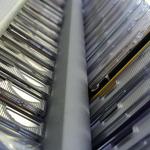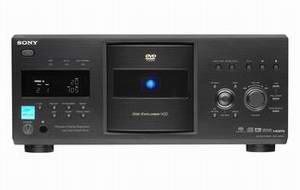
Your monstrous collection of compact discs has gotten a little out of hand. Billions upon billions of them are scattered throughout your home. They used to be the top-of-the-line in sound quality. Times have changed. MP3s have taken over. And now you have no idea where to put all your CDs or what to do with them. So what do you do?
Well, there are about as many options as CDs in your titanic accumulation. But let’s take some time to cover the most popular—and arguably most effective—ways to do this.
CD Changer
One option, which was popular a few years ago (and still holds its own), is to purchase a large capacity CD changer. I actually bought a fifty-one CD changer back in the day (mid-1990s) as a means to better organize my moderate mass of compact discs. The stereo system was state of the art back then, and I was on top of the world.
Today you can purchase gargantuan 500+ disc CD changers for fairly reasonable rates, allowing you to keep your CDs well-organized and niftily consolidated. However, you'll still have to keep track of your CDs somehow.
Pros:
- Provides storage for CDs
- Keeps CDs well-organized and niftily consolidated
Cons:
- Difficult to keep CD track list updated when new ones are added to your library
- Mechanical failure can cause a huge problem, and be expensive to fix
Portable MP3 Players
 Many techies agree that the most convenient and effective way to store music is on a computer storage device in MP3 format. Arguably, the most popular of these is the iPod, a handheld MP3 storage unit and playable device compatible with Macs and PCs.
Many techies agree that the most convenient and effective way to store music is on a computer storage device in MP3 format. Arguably, the most popular of these is the iPod, a handheld MP3 storage unit and playable device compatible with Macs and PCs.
There are also a number of portable MP3-playing devices similar to the iPod, such as the Sansa and Microsoft's Zune. So, if you want to choose one, do your homework to find out which will work the best for you.
Pros:
- Portability
- Convenience
- Ease of organization
Cons:
- Not enough storage space for those with a titanic CD library
- Computer crash can delete all stored music files, and be a massive pain in the rear
External Storage Device
 If you have an incredibly large number of CDs that you want transferred to MP3 (and they won’t all fit on your portable MP3 player), you might try an external storage device for your computer. You can pull your MP3s from that drive, then play it on your chosen music suite program without any worries about storage restrictions. I have a My Book external drive by Western Digital. It’s a fairly handy external hard drive; it’s about the size of a hard–cover book and has 160GB of storage, plenty enough for what I need now.
If you have an incredibly large number of CDs that you want transferred to MP3 (and they won’t all fit on your portable MP3 player), you might try an external storage device for your computer. You can pull your MP3s from that drive, then play it on your chosen music suite program without any worries about storage restrictions. I have a My Book external drive by Western Digital. It’s a fairly handy external hard drive; it’s about the size of a hard–cover book and has 160GB of storage, plenty enough for what I need now.
However, there are those who need much more space. If space is all you need, try the Seagate FreeAgent Pro external hard drive with a whopping 750GB of storage space. If that's not enought for you, I would recommend LaCie’s Bigger Disk Extreme External Hard Drive with an insane 2TB storage drive (and an astronomical price tag as well, I might add). Looking to protect your data as well as find an external drive to grow with you over time? Check out the Drobo Data Robot from Data Robotics, which will keep your data safe while letting you seemlessly add drives in as your need for more room increases. If you need more than that, I'd suggest selling off your CDs and purchasing an aircraft carrier with the proceeds.
Pros:
- Endless hard drive storage space
- Easy and quick playback
Cons:
- Can be a bit pricy
- Not portable
So, if you’re still hauling around a huge conglomeration of compact discs, I’d recommend any one of these three options. They all work fine. It just comes down to which will work the best for you.
What do you do with all your CDs? Post your thoughts below.






Comments
being a dj kj vj or whtever
being a dj kj vj or whtever we are called nowadays... all my files are stored on a 500 gig external hard drive and its only 75% full and to back them up i bought 2 so its sorted... Maxtor 500g time 2 & purchased whilst on offer.. although somtimes slow.. its more than adequate for most needs and only cost £85 sterling per unit ....Mul07